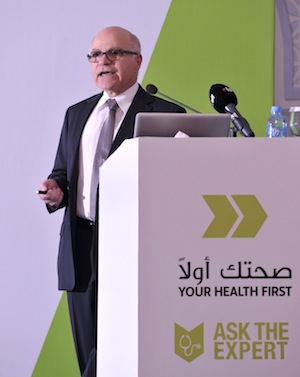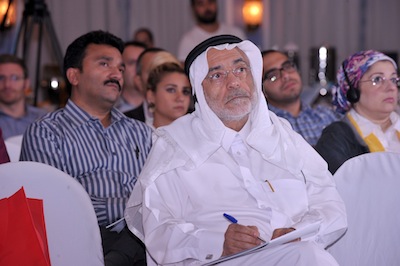WCMC-Q offers expert advice on beating stress
November, 2014

Dr. Kronfol explained that small amounts of
stress can actually be beneficial.
Two leading medical health professionals dispensed advice on how to deal with stress at the latest edition of WCMC-Q’s Ask the Expert series.
In an interactive Q&A session, Dr. Ziad Kronfol, professor of psychiatry at WCMC-Q, and Mariana Barrancos, psychologist at Hamad Medical Corporation (HMC), explained the physiological effects of stress on the body, discussed common sources of stress and suggested a variety of techniques that can be used to mitigate its negative effects, such as meditation, taking regular exercise and learning to evaluate problems in a calm and systematic manner.
Dr. Kronfol explained that stress in small doses is not detrimental, but excessive stress is associated with serious health issues such as high blood pressure, heart disease, diabetes and depression but that it can be dealt with very effectively.
He said: “In moderation, stress is not harmful and actually helps to drive us on to achieve good things and to make valuable contributions to our families, our workplace and our community. However, if stress builds up to the point that it becomes overwhelming, it can have serious negative effects on health.
“It is important to acknowledge that stress is real and has real physiological effects on our bodies – it is not something that is imagined or that we can just disregard. Fortunately, once we acknowledge that stress is real we can identify the causes of stress in our lives and take steps to deal with them.”
The Ask the Expert series is part of WCMC-Q’s Sahtak Awalan: Your Health First campaign, a five-year initiative that aims to encourage members of both the expat and Qatari communities to make healthy lifestyle choices.
Dr. Kronfol and Ms. Barrancos explained that sources of stress can be external, such as family problems, financial difficulties, job or school pressure, and relationship problems, and that how we appraise reality has a major impact on how we deal with stress.

The audience learned about different techniques of
managing stress.
Ms. Barrancos said: “There are many effective ways to deal with stress, such as taking time out to enjoy a hobby, taking plenty of exercise, eating a healthy diet and making sure you get enough sleep.
“Cultivating positive personal and family friendships, learning to evaluate and reframe your problems and limiting yourself from setting unachievable goals also help to combat stress. Many people find that relaxation methods such as meditation, breathing exercises and positive visualization help them to alleviate stress. Learning to manage stress is an ongoing process that requires time and practice.
“We should also resist the temptation to indulge in things that distract us from stress but don’t actually help to relieve it, such as comfort eating, smoking, and avoiding confrontation of stressful issues.”
Ms. Barrancos also said that consuming excessive amounts of sugary sodas, energy drinks and caffeinated beverages could exacerbate stress and should be avoided.
The free public seminar featured presentation by both Dr. Kronfol and Ms. Barrancos, after which the audience had the chance to ask the experts for advice about dealing with stress.
Dr. Kronfol added: “Stress affects us all in different, highly personalized ways, so it is absolutely vital that each of us discovers his or her own strategies for dealing with stress.
“If you feel that you are becoming overwhelmed by stress, acknowledge the problem and do not be reluctant to speak to your family doctor for advice. There are many trained mental health professionals and counselors working in public and private organizations including in primary health care centers and Hamad Medical Corporation’s Psychiatry Department who can offer help.”
